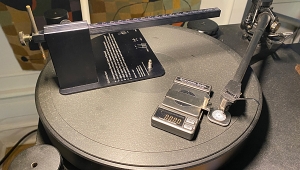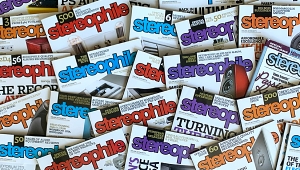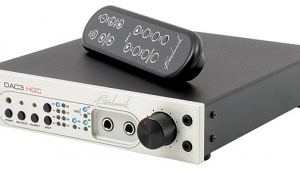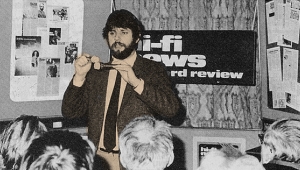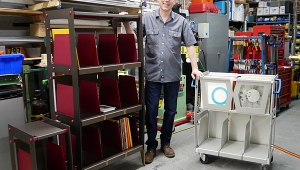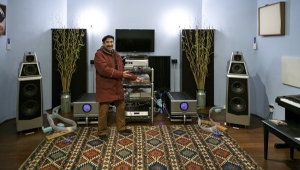| Columns Retired Columns & Blogs |
A Babel, a Babble . . . Page 8
Greenhill: Having seen a zillion reviews that end "This might be the right amp for you but you'll have to go and listen to find out for sure," your whole feeling about the review just goes zzziit! Because the guy is copping out from taking a stand. As a reviewer, if I like a product I'm going to say, "If I were in a position to buy this, this is the product I would buy." And if I don't, I'm not trying to tell other people they must do this. On the other hand, I believe what I'm saying. Okay? And I'm not going to qualify it to the point where it's meaningless.
Lipnick: At the end of the Levinson 23 review, I said, "I'll put my money where my mouth is and buy it." And I did.
Balgalvis: I always remember Gordon's comment at the end of the Paoli 60 review. Quite some time back, right? Where Gordon said, "The manufacturer/designer is a friend of mine. I'm not telling you to buy it, but I think this is the best there is." Which was very nice.
I'd like to agree with what Tom mentioned when it comes to cartridges—I've just spent some time with cartridges, as has Tom—I really believe that there's almost no store where a person can go in and get a fair evaluation of what a cartridge can do. Especially when you have to compare it. Because of franchises, this guy sells, let's say a Rowland, another guys sells a Reference, and etc., etc....
Holt: A cartridge audition is useless unless you audition it in the same tonearm that you use and with the same preamp.
Atkinson: The next point I'd like you all to comment on is that we seem to have a split in our readership. Many readers appear only to want to be told about the state of the art, what designers are doing when cost is no object. However, there is also a significant body of readers who say, "We don't want to hear about that, we'd like only to read about the best equipment that we can afford." How does the magazine handle those apparently incompatible demands?
Norton: What's the definition of what I, as a reader, can afford? It's going to vary dramatically...
Deutsch: I think there's room for variability. And there should be.
Olsher: You've got to have a smithering of both. You're getting back to the comments Arnie made about the car magazines. You know, you review a Ferrari, or a Lamborghini, because people dream about, "Gee, what would it feel like to own one of these things? To drive it. What's the feel of sitting in one of these things?" When I was that poor an audiophile, I used to dream about all this expensive stuff that I couldn't afford to buy. It's a vicarious pleasure and there is room for that. But let's not lose sight of the real world, and for most people, a $1000 amplifier is it!
Atkinson: But how would you feel as reviewers if I kept sending you a continuous diet of $750 preamps, $1000 amplifiers, and $1000 speakers? Pretty soon you'd say, "Enough!"
Holt: Like Sam.
Atkinson: Like Sam Tellig. We get so many letters asking what happened to the Cheapskate? And the answer is that Sam finally realized that most stuff is cheap because it's not very good.
Norton: You also lose your perspective, because when you don't know what the best stuff sounds like, you don't know how good the cheap stuff really is.
Holt: We are in the best position of any magazine to be evaluating mid-priced equipment, because we have the best basis of comparison. The state-of-the-art stuff.
Atkinson: But Gordon, you're the one person who gets most impatient with mid-price equipment for not sounding nearly as good as the very expensive stuff!
Holt: What I'm saying is, I think we should be definitely stressing the high-end stuff. But I think we should also be trying as best we can to at least be covering some of the lower-priced items. Because occasionally someone will come across something that's a damn good buy.
Guy Lemcoe: My feeling is that it's a question of affordable new entry-level high end, or used state-of-the-art high end. I don't know what the position of Stereophile is in recommending scouring Audiomart's pages for used components. At usually a fraction of the price new.
Norton: Read the old reviews.
Lemcoe: Exactly, this is what I find myself forced to do because I'm in no position to be able to afford, you know, a VPI Mk.III new from a dealer. If there was a dealer in Santa Fe. And this raises a problem with the uniqueness of Santa Fe—it's very difficult here to audition anything that you're excited about. You'd like to go hear it. And as a consequence I spend a lot of time going through the fine print in Audiomart with my little yellow pen...
Olsher: It's a treasure trove of goodies. One of the best preamps out there is the Audio Research SP-8, which can be had used for under $1000. Would you rather own an old SP-8 or a new Lazarus?
Lemcoe: Or a new PS Audio? I think this is an issue that manufacturers probably are not going to accept. That at some point in a review we might recommend buying a used VPI Mk.II as opposed to a new VPI Junior.
Atkinson: The magazine has totally avoided the fact that there's a large secondhand equipment market out there. Stereophile's focus is exclusively on the new.
Lehnert: But the new becomes the old at some point...
Lipnick: You can't satisfy everyone all the time. The thing is that lots of people who read the magazine are very opinionated, they're people who know what they want and don't give a damn about what anyone else wants. I think the magazine does have to talk about the very best equipment. But there is other equipment out there that is good, it's not high end, but it's worth reviewing and should be taken seriously. Of course, how much space do you have? You're the editor and I guess it really comes down to what profile you and Larry Archibald want this magazine to have. And the readers are going to have to live with that. But you're not going to satisfy everyone. Do you want to have it mainly high end or do you want to split it?
Atkinson: I want both. I want to read about the kind of equipment that I wish I was able to buy. On the other hand, I think an important role for the magazine is to give its readers hard buying information on what most of them actually purchase. Those twin goals are to me equally important.
- Log in or register to post comments

